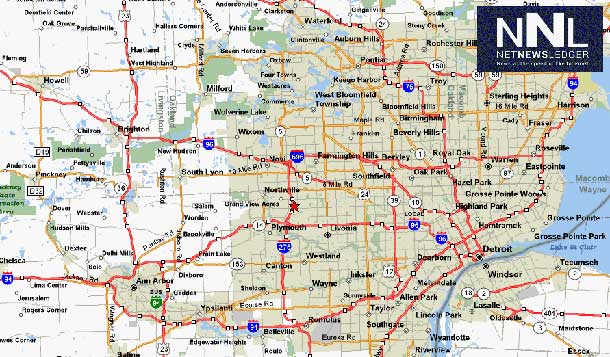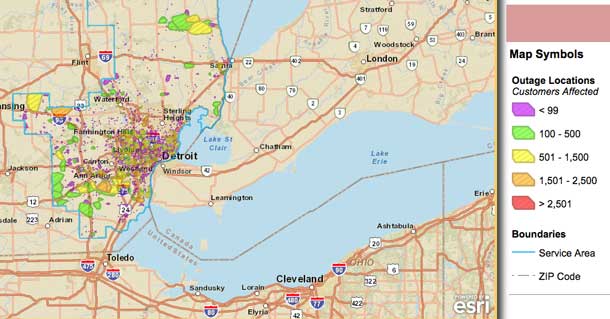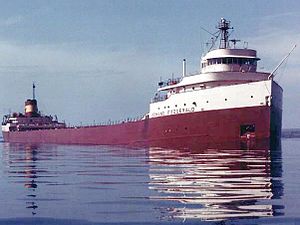 CHICAGO – Business – The troubles for Detroit continue. The City of Detroit is seeing the rating on their City Bonds downgraded.
CHICAGO – Business – The troubles for Detroit continue. The City of Detroit is seeing the rating on their City Bonds downgraded.
Fitch Ratings has downgraded the following ratings on the city of Detroit, Michigan (the city) bonds issued on behalf of the Detroit Water and Sewerage Department (DWSD) listed below. In addition, Fitch maintains the Rating Watch Negative on the bonds:
–$1.1 billion senior lien water revenue bonds to ‘BB+’ from ‘BBB+’;
–$565 million second lien water revenue bonds to ‘BB’ from ‘BBB’.
–$1.6 billion senior lien sewer revenue bonds to ‘BB+’ from ‘BBB+’;
–$788 million second lien sewer revenue bonds to ‘BB’ from ‘BBB’.
SECURITY
Senior lien water and sewer bonds are separately secured by a first lien on net revenues of each water and sewer system (the systems). Second lien bonds are separately secured by a second lien on the net revenues of each system after payment of senior lien bonds.
KEY RATING DRIVERS
BELOW INVESTMENT-GRADE RATING REFLECTS WEAK OPERATIONS: The system continues to exhibit weak financial performance, with fiscal 2013 unaudited results missing forecasts. Fitch believes financial improvement over the near term is unlikely given recent disclosure regarding the full scope of customer delinquencies. Fitch’s concerns about delinquencies are further exacerbated by the city’s status as a bankrupt entity.
UNCERTAINTY DRIVES THE WATCH: A key assumption underpinning Fitch’s ratings is that water/sewer bondholders are legally protected from impairment under Chapter 9 given the clear intent of the bankruptcy code to carve out debt supported by special revenues. Nonetheless, there remains uncertainty surrounding the city Emergency Manager’s (the EM) attempt to impair system bondholders under the city’s Plan of Adjustment (the POA), including removal of the call provision and subordination of bondholder security interest combined with threatened reduction in interest coupon. Fitch believes that there is no legal basis to compel bondholders to accept such impairment as proposed in the POA.
SEPARATE OPERATIONS: All system funds and accounts are maintained separate and distinct from other city funds including the city’s general fund. Excess system funds are invested by the bond trustee for and at the direction of DWSD.
HIGHLY LEVERAGED DEBT PROFILE: The systems’ debt load is expected to remain elevated for the foreseeable future. Borrowing needs for sewers are moderate and for water, minimal.
EXPANSIVE SERVICE TERRITORY: The systems provide essential services to a broad area. The water system covers roughly 43% of Michigan’s population, with over 70% of operating revenues coming from wealthier suburban customers. The sewer system includes roughly 30% of Michigan’s population, with over 50% of operating revenues coming from suburban customers.
STRONG RATE-ADJUSTMENT HISTORY: The governing body has instituted virtually annual rate hikes in support of financial and capital needs. While there have been recent changes in the city’s governance structure through the appointment of the EM, Fitch does not view this change as a concern at this time.
RATING SENSITIVITIES
IMPAIRMENT OF BONDHOLDERS: Fitch would almost certainly view the court’s confirmation of the POA as filed, or a similar variation whereby bondholders are impaired, as a distressed debt exchange leading to a ratings downgrade to as low as ‘D’.
WEAKENED FINANCIAL PROFILE: DWSD’s inability to maintain at least breakeven operations would likely result in a further downgrade.
SUSTAINED RATE INCREASES AND IMPROVED COLLECTIONS: Management’s ability to consistently increase rates while improving residential retail collections will be important in maintaining the rating.
CREDIT PROFILE
CHAPTER 9 LEGAL PROTECTIONS AND SEPARATION FROM CITY OPERATIONS
The ratings continue to consider Fitch’s view that there is substantial protection provided to the DWSD’s system debt as it constitutes special revenue obligations under Chapter 9 of the bankruptcy code. The ratings also consider a separation of system funds from other city funds as required under city charter and the bond ordinance; billing and collection of rates and charges by DWSD; relative autonomy by the department’s governing structure to oversee the affairs of the system without undue influence by the city; and retention of surplus funds by the system.
DWSD is an enterprise fund of the city and therefore is not entirely free from potential city influence. Any actions taken that directly or indirectly change this historical paradigm could exert immediate and significant credit pressure on system bonds.
NEGATIVE WATCH MAINTAINED ON CITY’S PROPOSED POA
The Negative Watch continues to reflect uncertainty regarding potential event risks related to the EM’s actions that attempt to impair DWSD bondholders. The filing of the POA is just another step in the process but does provide more insight on exactly how the city plans to treat all creditors.
Fitch sees no apparent reason for DWSD bondholders to accept any impairment (including voting for the POA) given the very strong legal position of this debt within Chapter 9 bankruptcy proceedings. Should the POA be confirmed as filed and thereby result in impairment to bondholders, Fitch would almost certainly view the action consistent with a distressed debt exchange and downgrade the rating on the bonds to ‘D’.
The POA proposes various impairments to DWSD bondholders either if a transaction transferring operation of DWSD’s assets to a regional utility authority (the GLWA) is effected or DWSD remains a department of the city. The POA scenario that transfers water/sewer operations to GLWA would impair the call protection of existing non-callable bonds (class 1B and 1D claims in the case of water and sewer bondholders, respectively) whether existing bondholders were issued exchange bonds or the bonds were cash defeased subsequent to confirmation of the POA. For bondholders receiving exchange bonds, the security interest would also be impaired, as bondholders’ current security pledge would be subordinated to a new transfer payment from GLWA to the city, with no cap of the transfer payment specified in the POA.
Bondholders voting against the POA would be impaired as a result of receiving different interest coupons than currently held, with such coupons virtually guaranteed to be lower than the existing coupons; bondholders voting for the POA may elect to receive exchange bonds with coupons that are the same as the existing bonds’ coupons.
Impairments to bondholders under the POA scenario where DWSD remains a department of the city are essentially identical as under the GLWA transfer. The only exception is that existing DWSD bonds could be reinstated prior to the effective date of the POA as opposed to being cash defeased.
WEAK FINANCIALS AND UNCERTAINTY DRIVE DOWNGRADE
The system’s fiscal 2013 audited results are unavailable. The delay is due to unresolved issues relating to the city’s bankruptcy filing and the application of appropriate financial accounting and related disclosures in this scenario. Recently issued DWSD unaudited results for fiscal 2013 show all-in sewer bond debt service coverage (DSC, including senior, subordinate and junior lien state revolving fund debt) at 0.95x as calculated by Fitch, well below its original projection of 1.22x. DSC for the water bonds was slightly higher at 1.14x but also below prior expectations of 1.29x.
The decrease in DSC is primarily due to a decline in retail and wholesale revenues. The sewer system met its sum-sufficient rate covenant for fiscal 2013 largely due to the bond documents’ exclusion from net revenues non-cash annual OPEB accrued expenses (totaling $13.6 million). This approach differs from Fitch’s calculation of DSC which incorporates financial accruals. Bond ordinance debt service coverage based on the unaudited results for sewer was 1.02x and for water was 1.24x.
Significant delinquencies by city retail customers likely also account for some of the revenue decline. While the system has experienced above-average delinquencies for several years, new delinquent account information provided by DWSD reveals the severity of the problem. Approximately 65% of the city’s residential water and sewer customers are at least 60 days delinquent as of Jan. 3, 2014. Fitch believes the recent disclosure in conjunction with challenges to remedy this issue in the already pressured operating environment supports a below investment-grade credit profile. Management reports addressing the delinquency problem is a top priority and has begun implementation of more timely shut-offs.
Fitch believes the system’s liquidity metrics likely remain below average although unrestricted cash balances for fiscal 2013 have not been fully reported. As of the most recent financial audit (fiscal 2012), days cash on hand was a relatively low 131 days for sewer and 183 days for water.
DWSD estimates that fiscal 2014 revenues to date are running below budgeted levels, again, due to lower system billings. The systems’ operating expenses are estimated to be under budget as a result of attrition and other non-personnel cuts. DSC for fiscal 2014 is projected to total 1.3x for sewer and 1.35x for water. However, Fitch believes DWSD may have difficulty achieving the level of revenue growth forecasted assuming base year revenues from 2013 unaudited results. Consequently, Fitch expects fiscal 2014 DSC to be lower than DWSD’s projections, possibly significantly.
Sewer system revenues are likely to perform closer to projections starting in fiscal 2015 because of a recently adopted process to simplify rate setting for all suburban sewer customers. Under the new process, suburban customers will have one fixed-rate to pay on a monthly basis, eliminating fluctuations that are typical with volumetric charges. Currently, volumetric charges account for approximately 65% of the suburban sewer bill.
LOSS OF LARGEST WATER CUSTOMER INTERMEDIATE TERM PRESSURE
DWSD is poised to lose its largest wholesale customer when the 35-year contract to sell water to Flint, MI expires on April 16, 2014. Flint accounted for $22 million (or 6%) of the system’s total billed revenue for fiscal 2013. Flint’s departure from the system is expected to happen sometime over the next three to five years, adding pressure to DWSD’s already narrow finances.
The rating assumes relative stability in the wholesale customer base. Management maintains that there are few viable options other than DWSD for most wholesale customers to purchase treated water. The system’s ability to absorb the revenue impact from losing its largest customer and maintain all-in sum-sufficient DSC is key to stability in underlying credit quality.
SYSTEM LEVERAGE REMAINS HIGH
Fitch expects leverage for both systems to remain high for the foreseeable future. DWSD’s sewer debt profile is relatively weak with long-term debt per customer totaling a high $3,830 for sewer and $2,079 for water. Principal payout is slow with only 28% of sewer debt maturing in 10 years; 26% for water.
The systems’ 2015-2019 capital improvement plans (CIP) total approximately $505 million each for water and sewer. Near-term debt issuances totaling $128 million for sewer is expected in fiscal 2015 with $155 million for water in fiscal 2016.
The water CIP is largely unchanged from the previous plan and the sewer CIP reflects a 31% decrease in planned spending. Capital cost containment reflects management efforts to preserve cash by deferring certain projects for approximately 18 months. Management has also planned the deferral of certain capital projects while it completes and implements a strategic facilities plan (SFP) during fiscal 2014. The SFP will prioritize future capital investments.
BROAD SERVICE AREA ENHANCES SYSTEM STABILITY
The water system is a regional provider serving around 4.2 million people or nearly 43% of Michigan’s population, including the city’s population of over 700,000. The system serves the city on a retail basis and 124 communities through 84 wholesale contracts. The service territory consists of an area of 138 square miles in Detroit and 981 square miles in eight counties.
The sewer system is a regional provider serving around 2.8 million people or nearly 30% of Michigan’s population, including the city. The system serves the city on a retail basis and 76 communities through 22 wholesale contracts. The service territory consists of an area of 138 square miles in Detroit and 850 square miles in three counties.
Population and customer growth for both systems have experienced modest annual declines for a number of years. Detroit’s population in particular has experienced continuous decline, but suburban areas have picked up most of the migration.
CONSISTENT SYSTEM RATE INCREASES
The board has consistently raised rates to meet financial and capital needs. However, unfavorable operating conditions (including very high delinquencies) and rising fixed costs have muted the positive revenue impact. For fiscal 2013, the board raised charges 9.9% and 6.7% for city retail and suburban wholesale customers, respectively. For fiscal 2014, DWSD implemented 4% increases on July 1 and another 4% increase has been proposed for fiscal 2015. Annual increases of 4% are preliminarily forecast for fiscals 2016-2019.
Rate flexibility is hampered by weak income levels in the city. Retail rates for the sewer system well exceed Fitch’s 1% of median household income (MHI) affordability benchmark (1.8%) given the weak MHI within the city. The water system’s retail rates remain around Fitch’s MHI.
Additional information is available at ‘www.fitchratings.com‘.
In addition to the sources of information identified in Fitch’s Revenue-Supported Rating Criteria, this action was additionally informed by information from Creditscope.
Applicable Criteria and Related Research:
–‘Revenue-Supported Rating Criteria’ (June 2013);
–‘U.S. Water and Sewer Revenue Bond Rating Criteria’ (July 2013);
–‘2014 Water and Sewer Medians’ (Dec. 2013);
–‘2014 Outlook: Water and Sewer’ (Dec. 5, 2013).
Applicable Criteria and Related Research:
2014 Outlook: Water and Sewer Sector
http://www.fitchratings.com/creditdesk/reports/report_frame.cfm?rpt_id=724357
2014 Water and Sewer Medians
http://www.fitchratings.com/creditdesk/reports/report_frame.cfm?rpt_id=724358
U.S. Water and Sewer Revenue Bond Rating Criteria
http://www.fitchratings.com/creditdesk/reports/report_frame.cfm?rpt_id=715275
Revenue-Supported Rating Criteria
http://www.fitchratings.com/creditdesk/reports/report_frame.cfm?rpt_id=709499





